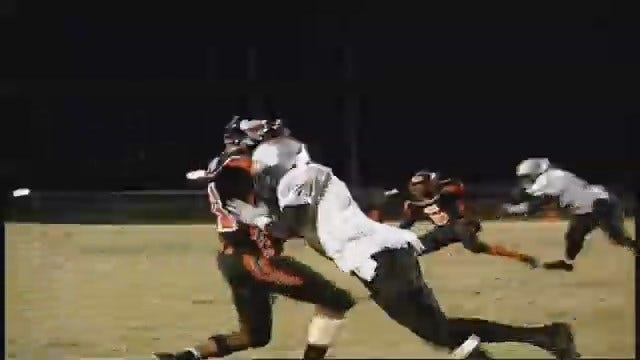Tulsa Researchers Have More Questions Than Answers Regarding Concussions
The possible dangers of football first came to light with high profile stories involving NFL players, but now researchers are discovering that much younger players are also at risk.Wednesday, August 27th 2014, 11:26 pm
The possible dangers of football first came to light with high profile stories involving NFL players, but now researchers, including a team in Tulsa, are discovering that much younger players are also at risk.
From the pros, to high school and even the local pee wee league, football is all about taking a hit; and while everyone is talking about concussions these days, there are still more questions than answers.
Terry Hood: “I was surprised how much we don't know about brains.
Dr. Patrick Bellgowan: “That's completely true, and particularly with concussions, we know almost nothing.”
Bellgowan is part of a team from Tulsa's Laureate Institute for Brain Research that is studying the effects of concussions.
Unfortunately what they're finding is that even relatively mild brain injuries can have devastating consequences.
Kendra Britain's son Tyler was just 13 years old when he was hit in the head during a kick-off in a middle school football game, then just minutes later, was put back into another play; a combination now known to be extremely deadly.
“I remember thinking I'll just dive for it so it looks cool or something like that,” Tyler said.
“When he went back to school, his memory was failing him. He was forgetting homework at home, in his locker, the teachers were yelling at him,” Kendra said.
The symptoms didn't stop there.
Tyler's mom said, “Six months goes by and he's still having problems, and he's crying a lot. He's very emotional, he's suicidal, and we don't know how to handle it.”
While Tyler's case was exceptionally severe, his symptoms are consistent with the early findings of Laureate's study on TU football players, which found changes in the area of the brain that controls memory and emotion, the hippocampus.
“What we found was that college football players had smaller hippocampi, regardless of if they had a history of concussions or not.” Bellgowan said.
There's has another alarming statistic according to Bellgowan, ten percent of the kids who suffer just one concussion have a risk, like Tyler, of suffering long term effects.
Terry Hood: “I have to tell you, if I had a son in football right now, I would be pretty terrified hearing you say these things.”
Bellgowan: “Well, one thing, it's not just football, it's repetitive head hits.”
However it happens, Bellgowan has witnessed the consequences.
“What I see often, and it's really sad, is you see 15, 16-year-old kids who have light problems, who have sound problems and headaches every day, who cry for no particular reason,” he said.
It's called post-concussion syndrome, and technology is trying to come up with solutions.
Helmets are getting more sophisticated - one has a special shock bonnet inside designed to lessen the impact of a hit - but none of them can yet claim to be concussion proof.
What we do have is technology that can track hits to the head that allow coaches and parents to track players and act immediately if they take a big hit.
Some college teams are already outfitted with the devices, which sell for about $150.
Kendra said if it helps protect kids, it's worth every penny. Her son is still suffering the effects of his concussion four years later.
“Sometimes I'll have a migraine where it's on both sides of my head and it doesn't go away at all,” Tyler said.
Bellgowan said, “That's the kind of kid I've always said really needs to be shown to the public, this is the effect. It's a very small proportion, but this is the risk that you're taking.”
After all of that, it may surprise you to learn that Bellgowan believes that American football has a solid future and it's largely because of changes being initiated by the NFL itself.
More Like This
August 27th, 2014
September 29th, 2024
September 17th, 2024
Top Headlines
December 14th, 2024
December 14th, 2024
December 14th, 2024
December 14th, 2024












